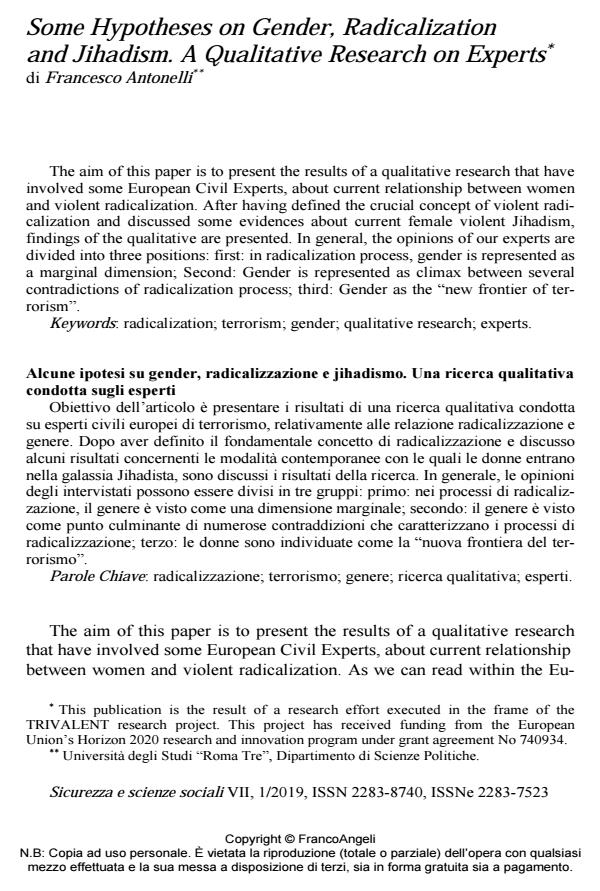Some Hypotheses on Gender, Radicalization and Jihadism. A Qualitative Research on Experts
Journal title SICUREZZA E SCIENZE SOCIALI
Author/s Francesco Antonelli
Publishing Year 2019 Issue 2019/1
Language English Pages 13 P. 255-267 File size 213 KB
DOI 10.3280/SISS2019-001020
DOI is like a bar code for intellectual property: to have more infomation
click here
Below, you can see the article first page
If you want to buy this article in PDF format, you can do it, following the instructions to buy download credits

FrancoAngeli is member of Publishers International Linking Association, Inc (PILA), a not-for-profit association which run the CrossRef service enabling links to and from online scholarly content.
The aim of this paper is to present the results of a qualitative research that have involved some European Civil Experts, about current relationship between women and violent radicalization. After having defined the crucial concept of vio-lent radicalization and discussed some evidences about current female violent Ji-hadism, findings of the qualitative are presented. In general, the opinions of our experts are divided into three positions: first: in radicalization process, gender is represented as a marginal dimension; Second: Gender is represented as climax be-tween several contradictions of radicalization process; third: Gender as the "new frontier of terrorism".
Keywords: Radicalization; terrorism; gender; qualitative research; experts.
- Aa.Vv. (2018). European Union Terrorism Situation and Trend Report. Europol -- (https://www.europol.europa.eu/activities-services/main-reports/european-union-terrorism-situation-and-trend-report-2018-tesat-2018).
- Al Jazeera (2007). Every Woman, Women of Hezbollah.
- Benslama F. and Khosrokhavar F. (2017). Le jihadisme des femmes : Pourquoi ont-elles choisi Daech? Paris: Seuil.
- Confortini C.C. (2010). Feminist Contributions and Challenges to Peace Studies International Studies Encyclopedia. Wiley-Blackwell and International Studies Association.
- Coolsaet R. (2018). Radicalisation – The origins and limits of a contested concept. In: Fadil N. and Ragazzi F., ed., Radicalisation in Belgium and the Netherlands: Narratives of Violence and Security. London: I.B.Tauris.
- Crenshaw M. (1981). The causes of Terrorism. Comparative Politics, Vol. 13, No. 4 (Jul., 1981): 379-399.
- European Parliament (2017). Report Radicalisation and violent extremism – focus on women (http://www.europarl.europa.eu/RegData/etudes/STUD/2017/596838/IPOL_STU(2017)596838_EN.pdf).
- Gaub F. and Lisiecka J. (2016). Women in Daesh: jihadist ‘cheerleaders’, active operatives? European Union Institute for Security Studies, Brief Issue 27.
- Grassi V. and Guercio L. (2018). Donne, pace e sicurezza tra essere e dover essere. La parola alle donne in Medio Oriente e Nord Africa. Milano: FrancoAngeli.
- Juzik J. (2004). Le fidanzate di Allah. Volti e destini delle Kamikaze cecene. Roma: Manifesto Libri.
- Katz E. and Lazarsfeld P.F. (1955). Personal influence: The part played by people in the flow of mass communications. New York: The Free Press.
- Khosrokhavar F. (2014). Radicalisation. Paris : Maison des Sciences de l’Homme.
- Lahoud N. (2014). The neglected Sex: The jihadis’ exclusion of women from Jihad. Terrorism and political violence, Vol. 26:5: 780-802.
- McDonald K. (2018). Radicalization. Cambridge: Polity Press.
- MEMRI (2002). Jihad and Terrorism, An interview with the mother of a suicide bomber, 19 June 2002 -- (https://www.memri.org/reports/interview-mother-suicide-bomber).
- Musolino S. (2017). Soggettività femminili e violenza politica. Udine: Mimesis.
- Newman E. (2006). Exploring the “Root Causes” of Terrorism. Studies in Conflict and Terrorism, 29(8): 749-772.
- Pearson E. and Winterbotham E. (2017). Women, gender and Daesh radicalisation. The RUSI journal, 162:3: 60-72.
- Skjelsboek I. and Smith D. (2001). Gender, Peace and Conflict. London: Sage.
Francesco Antonelli, Some Hypotheses on Gender, Radicalization and Jihadism. A Qualitative Research on Experts in "SICUREZZA E SCIENZE SOCIALI" 1/2019, pp 255-267, DOI: 10.3280/SISS2019-001020